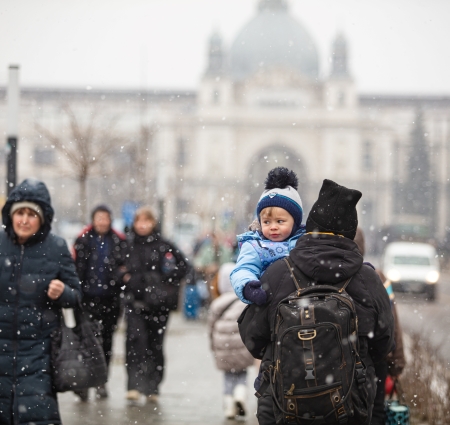On social media people are arguing about the reasons for the massacres at Bucha, Irpen and other places in Kyiv region. They are not asking why, so much as “for what reason”, with what aim? I have my opinion, as follows.
At the beginning of March, I heard a woman, who had been able to get out of occupied Melitopol with her family, talk about it. I’ll tell the story, as I remember it – so it’s not a documented record, of course, but my re-telling, albeit directly from the witness. As far as I understood, she lived somewhere in the suburbs of the city, in a private house.
The Russian army arrived in Melitopol on 26 February. There was no battle for the city. For several days we sat at home and watched an endless stream of Russian military vehicles. It was too frightening to go out – and there was no reason to: the Russians had looted all the shops on the first day.
And then [so, on 1 or 2 March, AD] our neighbours for some reason set out for their allotment, to plant something. One of the military vehicles stopped. Two Russian soldiers got out and killed the whole family, our neighbours. Husband, wife and two children. Then the soldiers got back into their vehicle and left.
After this we had no doubt. We collected all the things we could, and half an hour later left the city in our car. It took 24 hours to get to Zaporozhya [it is a 133 kilometre journey, AD]. There were Russian checkpoints all along the way. We were constantly stopped, they examined the car, and searched us. But all the same, we made it.
What are the explanations? Why, for what reason, was that family killed?
This was right at the start. The Russians who killed that family had only been on Ukrainian territory for a day or two. Melitopol was already in the rear, from their standpoint. So it’s highly unlikely that these soldiers had been in a firefight or lost close colleagues. Furthermore, there was practically no battle for Melitopol: the Ukrainian army had left the city. So it was not revenge.
And it did not seem like they were carrying out orders, either. In the case of an order to “kill civilians”, even “under such-and-such circumstances”, things would not have been limited to killing one family, who happened to be at the wrong place at the wrong time. This was not carrying out an order; it was the “living creativity of the Russian masses”.
The murdered parents, of course, could have had pro-Ukrainian views. Or they could even have been signed up to a territorial defence unit. But none of this was known to the Russians who shot them. It was not even known to their neighbours. What’s more: underaged children, murdered together with their parents, could not possibly have been in a territorial defence unit.
Moreover, this was not the result of a breach of curfew rules or anything of that kind. These people were literally in front of their home, in their own country, in broad daylight, no kind of threat to anyone at all.
But they were killed.
Isn’t it really obvious, that these murders had no purpose whatever? That the Russians killed that family not “for a reason”, but just … because.
Because these murderers are a crazed, completely lawless bunch of gopniks. [See note at the end.] Because they enjoy killing people. Because they had automatic weapons, and they knew that nothing would happen to them as a result of these killings. They got back in their vehicle, and off they went.
Those same “simple Russian people”, armed, were in Bucha, Irpen, Borodyanka and so on. With the same psychology, intoxicated with the same impunity and with their sadism.
That’s the first thing that I wanted to say. And here is the second thing.
I really, really hope that I am wrong about this. But I fear that when the Russians are driven from Mariupol, Volnovakha and other towns and villages of Donbass, where the fiercest battles of this war are already going into their second month – then, what the world saw in the region around Kyiv, those hundreds of corpses of tortured, raped and executed people … all that will take second place. In comparison to what awaits us in the east of the country.
Note. Gopniks are thugs – but the word “thugs” does not convey the specific meaning of gopniks in post-Soviet societies. Anatoly explained in a message: “It’s a sub-culture of street gangs, mainly in the suburbs of cities and everywhere in smaller towns. You come across them fairly often in the streets, in public transport, and above all in the courtyard of your multistorey block of flats. Aggressive, uncultured, and cowardly. Ready to fight, five against one, beat you up and steal your money … or stick a knife in your kidney if you ask “why are you pissing in the stairwell?”
□ Anatoly Dubovik is an anarchist since 1989, and a historian of the anarchist movement. This is a facebook post, written on 5 April, translated and reproduced with permission.
Source > People and Nature
The Anti*Capitalist Resistance Editorial Board may not always agree with all of the content we repost but feel it is important to give left voices a platform and develop a space for comradely debate and disagreement.
Art Book Review Books Campism Capitalism China Climate Emergency Conservative Government Conservative Party COVID-19 Creeping Fascism Economics EcoSocialism Elections Europe Far-Right Fascism Film Film Review Fourth International France Gaza History Imperialism Iran Israel Italy Keir Starmer Labour Party Long Read Marxism Marxist Theory Migrants Palestine pandemic Police Protest Russia Solidarity Statement Trade Unionism Ukraine United States of America War Women


